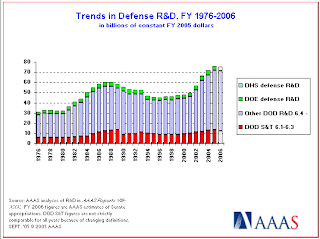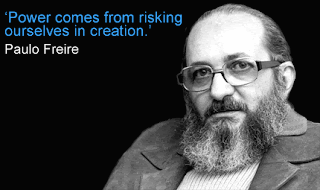 We get what we pay for and we invest in what we want. Think about our nation's research into war and into peace. Consider the costs of war and the costs of peace; which one is more advantageous? With war we get a spent-down economy, a massive consumption of nonrenewable resources, the slaughter of combatants and innocents alike (more of the latter than the former in every case nowadays), the pollution of our food chain and environment, and a legacy of wounded veterans who will require expensive care for decades even as their productive work capacities are diminished. The benefits of war are defense of territory and plunder of other people's wealth, mostly benefiting an elite class of war profiteers.
We get what we pay for and we invest in what we want. Think about our nation's research into war and into peace. Consider the costs of war and the costs of peace; which one is more advantageous? With war we get a spent-down economy, a massive consumption of nonrenewable resources, the slaughter of combatants and innocents alike (more of the latter than the former in every case nowadays), the pollution of our food chain and environment, and a legacy of wounded veterans who will require expensive care for decades even as their productive work capacities are diminished. The benefits of war are defense of territory and plunder of other people's wealth, mostly benefiting an elite class of war profiteers.So, if we plan on war, we should invest heavily in it and ignore investing in the only thing that can keep us out of war, that is, war prevention and peace creation. This is exactly what we have done as a nation. Our research into war is massive (measured in the scores of $billions annually) and our research into peace is scant (less than $20 million at the highwater mark) and diminishing. Is it any wonder our public discourse assumes war and sees little chance for peace?
Academic research in general increased greatly following WWII, when, between 1950 and 1970 it went up twenty-five-fold (Parsi & Geraghty, 2004). The lion's share has been gobbled up more and more by research for the Pentagon and the huge university grants can be found on the DoD website.
Peace research is ignored, for the most part, unless it angers hawks, as it has recently with the paltry bits tossed over to the United States Institute of Peace, which is under sincere threat of complete defunding. The problem with USIP is that for a fraction of the research budget, rational and effective methods of conflict management that avoid bloodshed and reduce the need for military expenditure are threatening the war profiteers. Peace research is bad for the death business, even though it's great for life and for human and ecological security in the US and elsewhere.

It's up to the underfunded, overworked (when research dollars increase, teaching loads decrease) peace educators to do for free what the war professors do for big pay--engage the public directly, since it is the power of the citizenry that can finally change this picture, if it is to be changed.
References
Parsi, K. P., & Geraghty, K. E. (2004). The Bioethicist as Public Intellectual. American Journal of Bioethics, 4(1), 17-23. doi:10.1162/152651604773067514














































